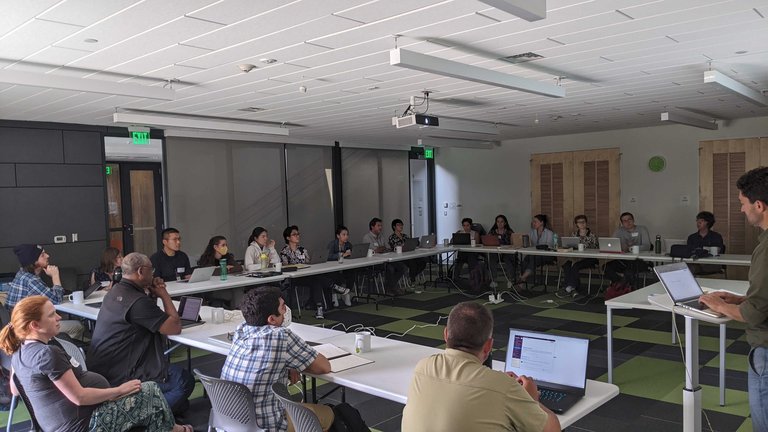About#
OceanHackWeek (OHW) is a 5-day collaborative learning experience aimed at exploring, creating and promoting effective computation and analysis workflows for large and complex oceanographic data. It includes tutorials, data exploration, software development, collaborative projects and community networking.
Its objectives are to:
Promote data and software proficiency in ocean scientists: Provide participants with computational and data science skills that can advance oceanography research, which often requires the integration and manipulation of diverse sources of data and models.
Facilitate inclusive community building: Connect oceanographers across disciplines and career stages and cultivate an open science and a sharing culture.
Learn more by browsing our previous OceanHackWeek events, held annually since 2018.
OceanHackWeek Presentations#
Lee, W-J., Tan, A., Staneva, V., Fernandes, F., Gum, J., Mayorga, E., Crone, T., Abernathey, R. (2020) Building Oceanhackweek: a week of data science, hacking, collaboration and more.
Poster abstract ED24C-3618, Ocean Sciences Meeting 2020, 16-21 Feb, San Diego, CA. - Poster pdf
Mayorga E., Biddle M., Fernandes F., Gentemann C., Gum J., Gumustel D., Kerney A., Koh J., Lee W. J., Martin P., Mitchell C., Moore T., Record N., Tan A. (2022) OceanHackWeek (OHW) - A collaborative model for expanding data science proficiency in oceanography.
Poster abstract 8375, Ocean Sciences Meeting 2022, 24 Feb - 4 Mar, Online. - Poster pdf
What is a HackWeek?#

The hackweek model has emerged in the data science community as a powerful tool for fostering exchange of ideas in research and computation by providing training in modern data analysis workflows. In contrast to conventional academic conferences or workshops, hackweeks are intensive and interactive, facilitated by three core components: tutorials on state-of-the-art methodologies, peer-learning, and on-site project work in a collaborative environment. Compared to hackathons typically focused on software development, hackweeks have a greater focus on learning and open-ended projects as informal education and peer learning opportunities. This setup is particularly powerful for sciences that require not only domain-specific knowledge but also effective computational workflows to foster rapid exchange of ideas and make discovery.
This is an excellent match with the nature of oceanographic research where data are large and complex and the community is diverse and collaborative. The hackweek model was spearheaded by the successful Astro-, Neuro-, and Geohackweek.
